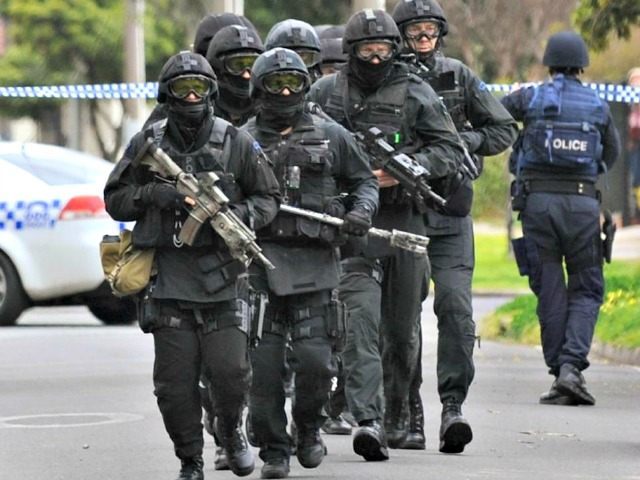The UK Daily Mail reports on a major terrorism bust in Melbourne, Australia, on Friday afternoon. Three homemade bombs were recovered from the suspect’s residence, identified as an underaged teen. Nine days of investigative work led up to the raid.
The individual in question drew the attention of law enforcement by ranting on Facebook against Muslims who cooperate with the police, advocating the imposition of sharia law in Australia, and supporting a fire-breathing Jamaican radical, Sheik Abdullah Faisal, who was expelled from the United Kingdom for advocating the murder of Jews, Christians, Hindus, and others.
Journalists are barred by Australian law enforcement from naming the suspect, as he is 17-years-old.
Australian media have been pressing the authorities to reveal his name as a matter of “the highest public interest,” and to help other parents protect their kids from jihad recruiters. The police have so far refused, citing relevant Australian laws concerning young criminal suspects, concerns about his mental health, and fears for his physical safety in detention.
Once again, we hear the tale of a young man radicalized with frightening speed, leaving the boy’s family “shocked and surprised” according to the police, while neighbors struggle to understand how a “100 percent gentleman” from a “normal Muslim family” could have been planning a bomb attack. Some reports suggest the boy’s path to radicalization began when his school forced him to shave off his beard.
The portrait emerging from police accounts is of an aspiring “lone wolf” jihadi influenced heavily by the speeches of Sheik Abdullah Faisal, whose Facebook page of fiery Islamist lectures the boy supported with a “like.”
Faisal advocates the imposition of sharia law on Western societies through violent conquest. “The way forward can never be the ballot,” he said in one lecture quoted by the Daily Mail. “The way forward is the bullet… we spread Islam by the sword.” He views the 9/11 attacks as a good start, and encourages Muslim women to equip their children with toy guns to foster a “jihad mentality.”
Inspired by these lectures, the Australian teenager declared on Facebook, “If you find a Muslim with a bomb, and report him to the police, you’re an apostate… if you think sharia law is too extreme, you’re an apostate.”
“What they see as crime, we see as praiseworthy to Allah,” he said of the Australian government. He declared Australian laws “go against Islam and everything Islam represents, and whoever helps the kafirs enforce them, he is a kafir himself.” Kafir is a derogatory term for non-Muslims.
The police say they have not yet discovered an active link between the teenager and organized terror groups such as ISIS. The Melbourne teenager’s plot also has not been directly linked to the Victoria arrest of five teenagers suspected of preparing an “ISIS-inspired” attack on an Anzac Day parade a few weeks ago.
The Daily Mail initially reported that an “unidentified female” was taken into custody along with the boy as they attempted to leave the premises in a car; the Melbourne Herald-Sun clarifies that this was the boy’s mother, reportedly attempting to drive him to a mosque at the moment the raid began. The police initially thought the boy might have been carrying a bomb at the time of his arrest, but the device in question turned out to be an asthma pump.
His older sister has insisted to media he just wanted to become a doctor, he was “against” ISIS, and he should not be judged by his fiery Islamist online rants, according to the Herald-Sun.
Australian Federal Police Commissioner Mike Phelan said of the teen radicalization crisis generally, “We’ve got to do something about this problem. All of us. All in the community. It’s got nothing to do with faith. This is about all the community, all families getting together, having a greater understanding of what your children are doing.”
FBI Assistant Director John Boles, visiting Australia for an international law-enforcement conference this week, addressed concerns about “the ability for young people to radicalize one another despite living in different countries,” as The Australian put it. He spoke of U.S. law enforcement having “good working relationships” with major social-media providers such as Google and Facebook, but measured this against the need for privacy, and the sheer volume of radical communication surging across the Internet.
The Melbourne teenager, like the shooters in Garland, Texas, imbibed radical Islamist ideology through the Internet, and generated alarming social-media traffic, but there is such a high volume of radical propaganda and bluster online that it’s difficult to spot the people who really mean what they say and intend to carry out their threats. The FBI disregarded months of online chatter from Texas shooter Elton Simpson because, as one expert put it, “there are so many like him.” Australian police acted aggressively, and confiscated explosives from a youth they say might have been only days away from selecting a target and carrying out an attack. If the authorities must wait until an attack is under way, we can only hope they respond as effectively as the officer in Garland who thwarted an atrocity.

COMMENTS
Please let us know if you're having issues with commenting.